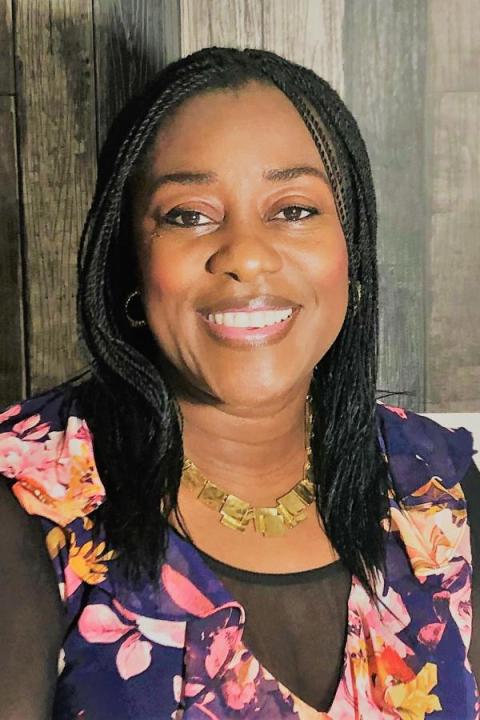Pictured above: Sandra Kaddy, president of the Seacoast African American Cultural Center; Dzifa Patterson; Prof. Marta Werner of Loyola University Chicago; and UNH Prof. Casey Golomski at the Seacoast African American Cultural Center in nearby Portsmouth, NH, to which UNH students take field trips.
Learn about the relationships among communities of Africa and its Diasporas, including the United States, and the diverse meanings and power of Blackness globally.
What is Africana studies?
The Africana Studies minor program is the critical program at UNH for coursework, research and engagement with peoples of African descent. You’ll focus on the complex, multidimensional relationships among communities of Africa and its Diaspora, including the histories, cultures and issues of concern for these communities in the United States, and the diverse meanings and power of Blackness globally. You’ll explore these topics from interdisciplinary and global perspectives, meaning we’ll bring together insights and resources from several fields. The program is designed to serve the needs and interests of all UNH students regardless of background.
Why study Africana studies at UNH?
Africana studies faculty at UNH have core strengths in training students how to document and demonstrate that the past shapes the present; how to analyze and interpret how language and performance matters for cultural expression and making social and political claims; and how to undertake qualitative and mixed-methods research. You’ll learn to adopt antiracist, intersectional, multi-factorial and holistic understandings of diverse livelihoods and complex situations and how these approaches originate in critical theories and philosophies. Above all, you’ll learn how collaboration, commitment to justice and social change, and critical awareness are key ethical practices for engaging the world’s problems and opportunities.
Potential career areas
- Community organization and engagement
- Community, public and global health
- Diplomacy and international affairs
- Documentary, history and archival research
- Economic and environmental development and sustainability
- Education
- Human resources and diversity, equity and inclusion
- Journalism
- Marketing and market research
- Performing and visual arts
- Public and government relations
- Social work and social services
Curriculum & Requirements
The Africana studies minor encompasses multidisciplinary, comparative and global research with and about peoples and cultures of Africa and its Diasporas. Diaspora is defined by dispersals and mobilities of communities, the result of exploration, migration and or coercion. African Diaspora communities exist everywhere, from Europe, the Middle East and Asia, to South and North America. We consider how Africana heritage and culture is shaped by these long-standing, long-range connections between diverse places, making our focus importantly geographic and our content intrinsically cosmopolitan.
We foreground the experiences of African, African Diaspora and African American communities in our research, teaching and engagement. We consider how understanding exceptional experiences and histories of exclusion and communion can inform work for building a more sustainable, equitable and just world.
Blackness is a primary root for study and practice in the minor at UNH. Notwithstanding complex historic antecedents of race and racism, we consider how Blackness (/blackness) emerged as racial phenomena in the fifteenth century through global commodity capitalism. In this process, the modern enslavement and worldwide dispersal of African peoples arguably made up the first historic articulations of Blackness, the first major instance of globalization and one of the worst tragedies of human history with which we still reckon today. Throughout this history, the meanings and operations of race and racism in local contexts have not been altogether uniform but nonetheless reveal common dynamics of Black peoples’ marginalization and structural dispossession of sociocultural, political and material resources.
In this root, students learn about varieties of historic and contemporary Blackness and what it means to be Black (/black): as lived experience, categorical attribution and aspect of intersecting identities; as creatively spiritual, aesthetic, and discursive expression and media; as antiracist reclamation and foundation for agency, activism and sociopolitical mobilization; and as a fount for queerness, love, joy and liberation. Our students and faculty consider how Black experiences are multidimensional and multivalent, subject to ongoing clarification within and among diverse communities worldwide, and differently and lyrically voiced and performed for multiple means and ends. We consider how Blackness entails an existential and practical quest for freedom from oppressive orders and boundary-making.
The program has a strong focus on coursework and research on African American and or Black peoples in the United States, as their cultures and history have been integral to the development of the nation-state and also highlight the country’s problems and promises. The program also offers many courses on the cultures and history of Africa and its other Diaspora communities. Our courses range from the humanities to the social and natural sciences, and our approaches and methods are applicable to virtually all areas of study at UNH. Students are encouraged to take courses from a variety of disciplines. The minor therefore is designed to serve the needs of all students, regardless of their background, and to complement their work in their major fields of study.
We maintain close intellectual and practical solidarities with UNH’s Center for the Humanities, Department of Women’s and Gender Studies, and other interdisciplinary minor programs in American Studies, Native American and Indigenous Studies, Latin American, Latinx, and Caribbean Studies, Asian Studies, Queer Studies, and Race and Ethnic Studies. Our program faculty also maintain ties with Black educational and community organizations, such as the Seacoast African American Cultural Center, Black Heritage Trail of New Hampshire, Black Lives Matter chapters, and others in the region.
The introductory course is meant to provide students with a general understanding of subjects and areas within the related fields African, African Diaspora, African American and Black studies. Electives enable students to explore their interests and or develop greater understanding and synthesis of these subjects and areas. The upper-level course requirement is meant to be a culmination of a student’s work in the minor and key conversations with program faculty about future research and graduate study, community engagement, and careers. Students should arrange to meet with faculty teaching this course early in the semester to establish goals for this culminating experience. Study abroad credits may also count with permission from the coordinator or other program faculty. A list of approved courses are posted each semester online.
Students can also pursue independent study and internship options as well for their elective or upper-level course requirement, with on-campus or community organizations such as the UNH Beauregard Center, Black Students Union, African Student Association, Seacoast African American Cultural Center, Black Heritage Trail of New Hampshire or local chapters of national organizations. These options are supervised by program faculty and may be taken under the AFAM or other departmental codes.
The minor consists of completing five courses, 4-credit courses (or any course combination for 20 credits total).
Students must earn a C- or better, and maintain a 2.0 grade-point average in courses taken for the minor.
Minor Requirements
| Code | Title | Credits |
|---|---|---|
| Introductory Course | ||
| Select one course from the following: 1 | 4 | |
ANTH 500 | Peoples and Cultures of the World (Only topic D: Sub-Saharan Africa) | |
GEOG 550 | Sub-Saharan Africa: Environmental Politics and Development | |
HIST 505 | African American History | |
HIST 588 | History of Modern Africa: 1870 to the Present | |
| Electives | ||
| Select 12-credits from the following pre-approved elective courses: | 12 | |
CLAS 550B | Identities and Difference in the Ancient World: Slaves and Masters | |
CLAS 551 | Race, Ethnicity, Class & Classics | |
CMN 567 | Gender, Race, and Class in the Media | |
ENGL 440A | Honors/On Race in Culture and Society | |
ENGL 550 | Introduction to the Literature and Culture of Race | |
ENGL 581 | Reading the Postcolonial Experience | |
ENGL 693 | Special Topics in Literature (Only topic: African American Writers) | |
ENGL 778 | Race and Gender in Film and Popular Culture | |
ENGL 787 | English Major Seminar (Only topic: Slavery and Culture) | |
GEOG 402 | World Regions: Asia and Africa | |
HIST 440A | Martin Luther King, Jr., and the Struggle for Racial Justice | |
HIST 440D | Honors/Citizens and Persons | |
HIST 611 | Civil War Era | |
HIST 690 | Seminar: Historical Expl (Only topic: Race in 20th Century America) | |
HDFS 757 | Race, Class, Gender, and Families | |
MUSI 460 | Jazz Band 2 | |
MUSI 463 | Jazz Combo 2 | |
MUSI 562 | Jazz Piano 2 | |
MUSI 563 | Jazz Guitar 2 | |
MUSI 762 | Jazz Piano 2 | |
MUSI 763 | Jazz Guitar 2 | |
PHIL 780 | Special Topics (Only topic: Race, Gender and Social Justice) | |
SOC 530 | Sociology of Race and Ethnicity | |
SW 630 | Race Equity in Health and Human Services | |
WGS 401W | Introduction to Women's Studies | |
WGS 405 | Gender, Power and Privilege | |
WGS 444A | Race Matters | |
WGS 505 | Survey in Women's Studies | |
WGS 798W | Colloquium | |
| Upper-Level Course | ||
| Select one course from the following: 1, 3 | 4 | |
ANTH 685 | Gender, Sexuality and HIV/AIDS in Africa | |
ENGL 797R | Special Studies in Literature (Race & Racial Theories) | |
HIST 600 | Explorations (Only topic: Black and Indigenous NH) | |
HIST 797 | Colloquium (Only topic: Slavery, War and Emancipation) | |
SOC 645 | Class, Status and Power | |
| Total Credits | 20 | |
- 1
Course must be taught by AFAM program faculty member.
- 2
May require audition with the Music Department.
- 3
Internship and other courses with program faculty may also apply with permission.
Explore Program Details
-
ProfessorProgram Coordinator of Africana StudiesEmail: Casey.Golomski@unh.eduPhone: (603) 862-1864
UNH Resources
- Center for the Humanities
- American Studies
- Race and Ethnic Studies
- Women's and Gender Studies
- Queer Studies
Resources Beyond UNH
A search on “civil rights movement” provides links to more than 80 relevant websites and documents covering a wide range of civil rights topics and themes. Those sites, in turn, offer links to additional resources.
From the Association of College and Research Libraries (a division of the American Library Association), this is another excellent, vetted list of fantastic and wide-ranging online resources.
Introduction and capsule summaries of Library of Congress materials used and cataloged for the African American Odyssey exhibit. Searching the American Memory site uncovers many primary sources, some of which are available online.
Teacher-oriented webisodes 14 and 15 focus on the Civil Rights Movement.
This very interesting site contains much valuable first-person commentary and reflection, as well as links to images, documents, and a cool annotated timeline that emphasizes the contributions of ordinary citizens.
Southern Civil Rights movement timeline.
Additional African American Related Links
- Black Heritage Trail of New Hampshire
- Black Voices
- Hutchins Center for African & African American Research
- Mosaicbooks.com
- Museum of African American History, Boston
- NAACP Home Page
- Remembering Slavery: Those Who Survived Tell Their Stories
- Schomburg Center for Research in Black Culture
- Seacoast African American Cultural Center












